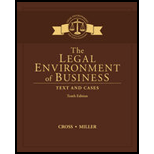
Bundle: The Legal Environment Of Business: Text And Cases, 10th + Mindtap Business Law, 1 Term (6 Months) Printed Access Card
10th Edition
ISBN: 9781337374835
Author: CROSS
Publisher: CENGAGE L
expand_more
expand_more
format_list_bulleted
Question
Chapter 2, Problem 1BS
Summary Introduction
Case Summary: J and M bought a house in J County, located across the street from a gravel pit. The county converted the pit to a landfill, which accepted many kinds of trash. The accumulated trash caused harm to the environment. J and M complained to the county, but the county did nothing. The plaintiffs filed a lawsuit against the county alleging infringement of federal environmental laws.
To Find: The plaintiff’s right to sue in this particular case.
Expert Solution & Answer
Trending nowThis is a popular solution!

Students have asked these similar questions
general accounting
provide correct option with calculation
Please explain the solution to this general accounting problem with accurate principles.
Chapter 2 Solutions
Bundle: The Legal Environment Of Business: Text And Cases, 10th + Mindtap Business Law, 1 Term (6 Months) Printed Access Card
Knowledge Booster
Similar questions
- Nicole Hill's weekly gross earnings for the week ending June 7th were $2,500, and her federal income tax withholding was $525. Assuming the social security rate is 6.2% and Medicare is 1.5% of all earnings. What is Flores' net pay?arrow_forwardProvide net income equal???arrow_forwardGive me solution fast pleasearrow_forward
arrow_back_ios
SEE MORE QUESTIONS
arrow_forward_ios
Recommended textbooks for you
 BUSN 11 Introduction to Business Student EditionBusinessISBN:9781337407137Author:KellyPublisher:Cengage Learning
BUSN 11 Introduction to Business Student EditionBusinessISBN:9781337407137Author:KellyPublisher:Cengage Learning Essentials of Business Communication (MindTap Cou...BusinessISBN:9781337386494Author:Mary Ellen Guffey, Dana LoewyPublisher:Cengage Learning
Essentials of Business Communication (MindTap Cou...BusinessISBN:9781337386494Author:Mary Ellen Guffey, Dana LoewyPublisher:Cengage Learning Accounting Information Systems (14th Edition)BusinessISBN:9780134474021Author:Marshall B. Romney, Paul J. SteinbartPublisher:PEARSON
Accounting Information Systems (14th Edition)BusinessISBN:9780134474021Author:Marshall B. Romney, Paul J. SteinbartPublisher:PEARSON
 International Business: Competing in the Global M...BusinessISBN:9781259929441Author:Charles W. L. Hill Dr, G. Tomas M. HultPublisher:McGraw-Hill Education
International Business: Competing in the Global M...BusinessISBN:9781259929441Author:Charles W. L. Hill Dr, G. Tomas M. HultPublisher:McGraw-Hill Education

BUSN 11 Introduction to Business Student Edition
Business
ISBN:9781337407137
Author:Kelly
Publisher:Cengage Learning

Essentials of Business Communication (MindTap Cou...
Business
ISBN:9781337386494
Author:Mary Ellen Guffey, Dana Loewy
Publisher:Cengage Learning

Accounting Information Systems (14th Edition)
Business
ISBN:9780134474021
Author:Marshall B. Romney, Paul J. Steinbart
Publisher:PEARSON


International Business: Competing in the Global M...
Business
ISBN:9781259929441
Author:Charles W. L. Hill Dr, G. Tomas M. Hult
Publisher:McGraw-Hill Education
